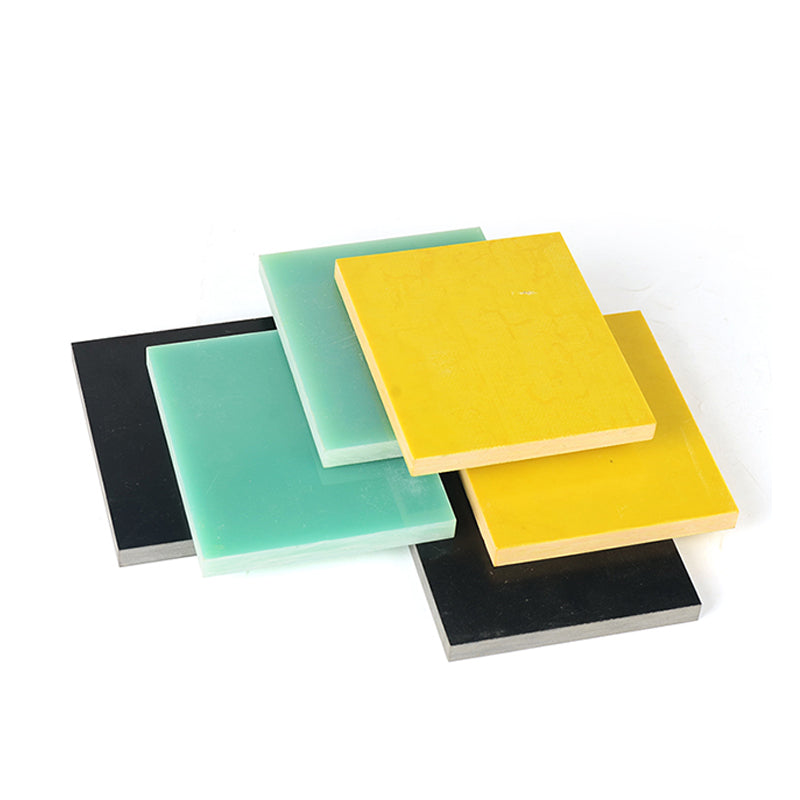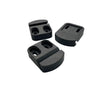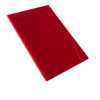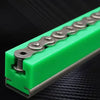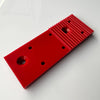Bakelite rods are fundamental in several industries, from automotive to electronics, thanks to their exceptional mechanical strength, electrical insulation, and heat-resistant properties. Their durability and versatility make them indispensable in critical components that must withstand demanding environments. Let’s explore how Bakelite rods serve these industries.
Automotive Industry: High-Performance Components
In the automotive industry, Bakelite rods are integral to components that endure high heat and mechanical stress. Their heat-resistant nature makes them ideal for manufacturing brake pads and clutch plates. The material's mechanical strength ensures that these components withstand repeated stress, delivering consistent performance over long periods. Moreover, Bakelite provides the stability needed for distributor caps, ensuring reliable electrical distribution within an engine’s ignition system.
Bakelite rods are also used in various insulation components in vehicles, such as ignition housings and insulation pads. These parts must resist high temperatures and provide dependable insulation in both electrical and mechanical applications, a role that Bakelite fulfills with ease.

Electronics and Electrical Insulation
Bakelite’s electrical insulation properties make it a go-to material in the electronics sector. Bakelite rods are commonly found in switches, transformers, and electrical insulators where they prevent current leakage and enhance safety. In high-frequency electronics, phenolic rods made from Bakelite material are used to maintain signal integrity, thanks to their low dielectric loss. This ensures that electrical systems operate efficiently without interference or degradation.
Moreover, electrical insulation rods made from Bakelite are used in critical systems that demand long-lasting performance in harsh environments. The material’s ability to resist high temperatures without deforming or compromising its insulating properties is crucial for maintaining the safety and effectiveness of electrical infrastructure.
Heavy Machinery and Industrial Equipment
In the world of heavy machinery, Bakelite rods offer a combination of strength and insulation that few other materials can match. Their use in gear wheels, bushes, and rollers ensures that these components maintain their structural integrity under high loads. Bakelite’s mechanical strength and dimensional stability also make it ideal for producing machine parts that must resist wear and tear over extended periods of use.
Additionally, Bakelite rods find applications in industrial machinery that require both heat resistance and electrical insulation. Whether in motor components or thermal insulators, Bakelite’s durability ensures that these machines continue to function optimally even in extreme conditions.
Customization for Specialized Applications
One of the greatest advantages of Bakelite rods is their adaptability for specialized applications. Custom Bakelite rods can be tailored to meet specific requirements in industries such as electronics and aerospace, where precision and durability are paramount. Additionally, cotton cloth Bakelite rods and fabric Bakelite rods offer enhanced mechanical strength for use in environments where high stress and extreme conditions are present.
This customization allows Bakelite to be utilized in a broad range of applications, from precision electronics to heavy-duty industrial components, further solidifying its place as a versatile material in modern manufacturing.
Differences Between Bakelite Rods and Sheets
Bakelite rods and Bakelite sheets are two versatile forms of the same phenolic resin-based material, but they serve different purposes in various industries. Their structural and functional differences make them suitable for distinct applications, ranging from heavy machinery to electrical insulation.
Structural Differences
Bakelite rods are cylindrical in shape and come in a variety of diameters, making them ideal for use in applications that require high mechanical strength and precise machining. They are often reinforced with materials like cotton fabric to create fabric Bakelite rods, which are designed to withstand heavy loads and extreme mechanical stress. This reinforcement enhances the rod’s durability, making it perfect for industrial components such as gears, bearings, and rollers.
On the other hand, Bakelite sheets are flat and can be produced in different thicknesses, from thin, flexible layers to robust slabs. These sheets are often used in large-scale applications where heat resistance and electrical insulation are required, such as in switchboards and circuit boards. Their flat structure allows them to be cut or shaped into panels or parts that can insulate or protect large surfaces from heat and electrical currents.
Functional Differences
While Bakelite rods excel in applications where rotational or mechanical forces are present, Bakelite sheets are more suited for stationary or surface-based applications. Bakelite rods are commonly used in machinery to manufacture parts like bushes, spacers, and insulation rods. Their cylindrical structure makes them ideal for components that rotate or experience dynamic forces, as the rod’s shape distributes stress evenly across the surface, enhancing durability.
In contrast, Bakelite sheets provide excellent coverage for insulating large areas in electrical and industrial applications. They are often used as protective barriers in high-voltage environments, where they prevent electrical currents from causing damage to nearby components. The smooth surface of these sheets allows for easy cutting and fitting into various shapes and sizes, making them ideal for custom applications like electrical panels, insulation barriers, and automotive dashboard panels.
Applications of Fabric Bakelite Rods
Fabric Bakelite rods, reinforced with cotton cloth or other materials, are specifically designed for heavy-duty industrial applications where both mechanical strength and insulation properties are critical. These rods are frequently used in high-stress environments like manufacturing plants and power stations, where machinery parts must endure extreme conditions while maintaining their shape and performance. The fabric reinforcement ensures that the Bakelite rod does not crack or wear under pressure, making it a reliable choice for high-load bearings, gear wheels, and thermal insulators.
Choosing Between Bakelite Rods and Sheets
The choice between Bakelite rods and Bakelite sheets depends largely on the specific requirements of the application. For rotational components, high-temperature insulation, or applications requiring strong mechanical resistance, Bakelite rods are often the preferred option. However, when broad coverage or surface insulation is needed, Bakelite sheets provide the ideal solution due to their flat and versatile structure.
By understanding the structural and functional differences between these two forms of Bakelite, industries can optimize their use of this phenolic material to meet their unique needs, ensuring both durability and efficiency across a range of applications.
Customization Options for Bakelite Rods
One of the standout qualities of Bakelite rods is their adaptability for custom applications. These rods can be manufactured in various sizes, compositions, and reinforced forms, such as cotton cloth Bakelite rods, to meet the specific demands of industries ranging from automotive to electronics. Customization ensures that Bakelite material retains its flexibility in serving a wide array of industrial applications.
Custom Sizes for Specific Industrial Needs
Bakelite rods are available in a wide range of diameters and lengths, making it possible to create custom Bakelite rods that precisely match the requirements of each project. These sizes can range from small, thin rods for delicate electrical components to thick, robust rods used in heavy machinery. The ability to customize dimensions allows manufacturers to cater to industries that need components to fit specific machinery or electrical systems.
For instance, small-diameter Bakelite rods are commonly used in the electronics industry, where precise insulation for compact devices is necessary. On the other hand, large-diameter rods are preferred for mechanical applications, where high mechanical strength and heat resistance are essential, such as in the manufacturing of bearings, bushes, and rollers.
Customized Compositions: Cotton Cloth Bakelite Rods
Cotton cloth Bakelite rods, also known as fabric Bakelite rods, are an excellent example of how Bakelite can be customized to enhance specific properties like mechanical strength and impact resistance. These rods are reinforced with layers of cotton fabric that are impregnated with phenolic resin, creating a material that combines the toughness of fabric with the durability of phenolic resin.
This customization is especially valuable in industries like aerospace and automotive, where components must endure both mechanical stress and high temperatures. Fabric Bakelite rods are designed to perform well under heavy loads, making them ideal for high-stress environments such as industrial equipment and high-load bearings. The fabric reinforcement also improves the rod’s resistance to wear and abrasion, ensuring a longer lifespan even in demanding conditions.

Application-Specific Customization
The customization options for Bakelite rods extend beyond size and composition. Custom Bakelite rods can be tailored with specific features to suit a wide range of industrial environments. For instance, industries that operate in high-humidity conditions may opt for water-resistant Bakelite rods, while those in electrical engineering might require rods with enhanced dielectric properties.
These custom features allow Bakelite rods to serve specialized roles in sectors such as telecommunications, where they are used in insulating rods for high-voltage lines, or in automotive engineering, where they function as thermal insulators for parts exposed to extreme heat. Each customization enhances the rod’s performance, ensuring it can meet the unique challenges posed by the specific application.
Versatility and Customization for Heavy-Duty Applications
For heavy-duty applications, custom Bakelite rods can be manufactured to include additional reinforcements or specific treatment processes that improve their resilience under stress. These custom treatments can enhance the heat resistance, chemical resistance, and mechanical properties of the rods, making them suitable for use in high-temperature and chemical-laden environments such as factories, power plants, and manufacturing facilities.
Custom Bakelite rods can also be produced to fit the precise requirements of machinery parts, such as gears, pulleys, and roller components. By tailoring the rods to fit unique specifications, manufacturers can ensure that they deliver the exact balance of strength, durability, and insulation needed for long-term performance in critical equipment.
This adaptability makes Bakelite a highly versatile material for custom industrial solutions. The combination of its thermosetting properties, mechanical strength, and insulating capabilities allows for virtually endless customization options to meet the needs of various sectors.
Why Bakelite Remains a Key Material in Modern Manufacturing
Bakelite, despite being one of the earliest synthetic plastics, continues to play a crucial role in modern manufacturing. Its unique combination of mechanical strength, cost-effectiveness, and versatility makes it an indispensable material across various industries, from electronics to automotive and heavy machinery.
Mechanical Strength and Durability
One of the primary reasons Bakelite material remains relevant is its high mechanical strength. Once cured, Bakelite becomes a thermosetting polymer, meaning it cannot be melted or reshaped, which provides excellent stability and durability under mechanical stress. Bakelite rods are used in industries where structural integrity and resistance to wear are essential. These rods are particularly valuable in manufacturing parts like gears, bearings, and bushes, where prolonged exposure to high loads and stress is expected.
Phenolic resin rods, often made from Bakelite, exhibit remarkable resistance to abrasion and impact, ensuring a long service life even in high-stress environments such as heavy machinery and industrial plants. This level of durability allows manufacturers to rely on Bakelite for parts that must endure constant use without frequent replacement.
Cost-Effectiveness
Bakelite’s cost-effectiveness is another factor contributing to its continued use in manufacturing. While more modern materials have emerged, Bakelite rods and sheets remain an affordable option for industries that need a reliable material for insulation and mechanical applications. Bakelite material offers excellent value for money, as it combines thermal resistance, electrical insulation, and mechanical strength at a lower cost compared to more specialized materials.
This cost advantage is particularly evident in large-scale applications where manufacturers require high volumes of material without compromising quality. For example, Bakelite sheets are often used in automotive parts, switchboards, and thermal insulators, all of which benefit from the material’s cost-efficiency.
Versatility Across Industries
The versatility of Bakelite is a major reason why it continues to be relevant in modern manufacturing. The material is used in a wide range of applications due to its ability to be molded into various shapes and forms. Custom Bakelite rods can be produced to meet specific industry requirements, whether they are used in electrical insulation, automotive components, or machinery parts.
In the electronics industry, for example, Bakelite rods serve as key components in transformers, insulators, and switches due to their excellent electrical insulation properties. In the automotive industry, Bakelite is favored for parts that need to resist both mechanical stress and high temperatures, such as brake pads and clutch plates.
The material’s adaptability extends to its ability to incorporate various reinforcements like cotton cloth in fabric Bakelite rods, which are used in environments where both mechanical strength and insulation are critical.
Heat and Electrical Resistance
Bakelite’s resistance to heat and electrical insulation properties further cement its position in industries where components are exposed to high temperatures and electrical currents. Its thermosetting nature ensures that Bakelite rods do not deform under high temperatures, making them ideal for use in furnace insulation, electrical panels, and high-temperature machinery.
The material's low electrical conductivity also makes it indispensable for electrical insulation rods, which are used in critical systems that require dielectric properties to prevent electrical shorts and ensure the safety of components in high-voltage environments.
Through its balance of properties, Bakelite remains a key material in modern manufacturing, offering both durability and versatility at an affordable cost.

Common Questions About Bakelite Rods and BeePlastics Customization Services
-
What is a Bakelite Rod and What is it Made Of?
A Bakelite rod is a type of synthetic plastic made from the polymerization of phenol and formaldehyde. This process produces a thermosetting resin that becomes rigid after curing. Bakelite rods are known for their mechanical strength, heat resistance, and electrical insulation properties, making them ideal for industrial and electrical applications.
-
What Are the Common Applications of Bakelite Rods?
Bakelite rods are widely used in industries like automotive, electronics, and heavy machinery. Their high mechanical strength makes them suitable for components like brake pads, gears, and bearings, while their electrical insulation properties are perfect for use in switches, insulators, and transformers.
-
Can Bakelite Rods Be Customized for Specific Industrial Needs?
Yes, BeePlastics offers extensive customization options for Bakelite rods. We can produce custom Bakelite rods in various sizes, diameters, and compositions, including cotton cloth Bakelite rods and fabric Bakelite rods, which are tailored for high-stress industrial applications. Our customization services can handle both sample customization and batch production based on your project needs.
-
Does BeePlastics Offer Sample Customization for Bakelite Rods?
Absolutely! BeePlastics supports sample customization for all our Bakelite products. Whether you're exploring specific dimensions or testing for mechanical strength, we can create custom samples to meet your specifications. We provide the samples free of charge, with the customer only responsible for shipping costs.
-
What File Formats Does BeePlastics Accept for Customization?
At BeePlastics, we accept a wide range of file formats to streamline the customization process, including PDF, CAD, and other common engineering and design formats. This flexibility allows us to accurately interpret your designs and produce custom Bakelite rods that meet your exact requirements.
-
Is There a Minimum Order Quantity (MOQ) for Custom Bakelite Rods?
No, BeePlastics does not require a minimum order quantity (MOQ) for any of our custom products. Whether you need a single Bakelite rod sample or a full batch production, we can accommodate your order size, making us an ideal partner for both small and large projects.
-
How Long Does It Take to Produce Custom Bakelite Rods?
The production cycle for custom Bakelite rods varies depending on the order volume and complexity of the design. However, at BeePlastics, we maintain real-time communication with clients regarding the production progress, ensuring transparency and timely delivery. Simple orders typically have shorter lead times, while more complex projects may require additional processing.
-
Can I Request Custom Compositions for My Bakelite Rods?
Yes, we offer the ability to tailor the composition of Bakelite rods to your specific needs. For example, we can produce cotton cloth Bakelite rods or fabric Bakelite rods that are enhanced for greater mechanical strength and impact resistance, making them suitable for demanding applications like gear wheels and thermal insulators.
-
What Industries Use Custom Bakelite Rods?
Custom Bakelite rods are used across various industries, including electronics, automotive, aerospace, and heavy machinery. They are ideal for components that require heat resistance, electrical insulation, and mechanical durability, such as electrical panels, ignition housings, and machinery parts.
-
Does BeePlastics Provide Free Samples for Testing?
Yes, BeePlastics provides free samples of our custom Bakelite rods for testing purposes. We believe in ensuring that our products meet your specifications before proceeding with larger orders. The samples are free, with only the shipping cost covered by the customer.
As we’ve explored,
Bakelite rods remain a foundational material in modern industries due to their
mechanical strength,
heat resistance, and
electrical insulation properties. Whether used in
automotive,
electronics, or
machinery,
Bakelite's versatility ensures it continues to be a key player in manufacturing. With the ability to create
custom Bakelite rods tailored to specific industrial needs,
BeePlastics offers a wide range of solutions, from
sample customization to
batch production. This adaptability, combined with
cost-effectiveness and
durability, makes
Bakelite rods indispensable in today’s manufacturing landscape. Whether you need a product to withstand
high temperatures or provide
electrical insulation,
Bakelite remains a trusted material that meets the challenges of modern industry head-on.




